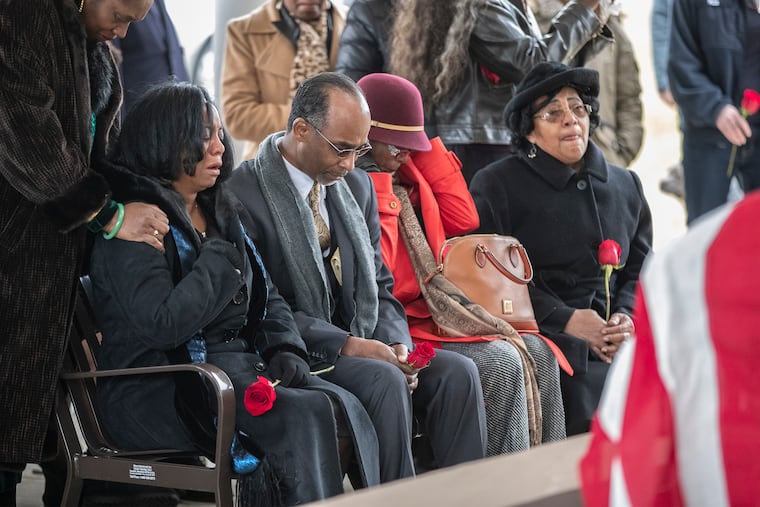Family and comrades bid farewell to Philadelphia Army vet Corey Michael Hadley at Bucks military funeral
“I want people to know that when we see soldiers return from war in coffins,” his mother said, “we don’t see the other soldiers walking behind who lost their lives, too, only they don’t know it yet.”

Rosalind Williams slowly rapped her knuckles on the coffin of her son, Corey Michael Hadley, in the gray stillness of Washington Crossing National Cemetery in Newtown, Bucks County.
The sounds of her gesture of grief and helplessness on Monday reverberated in the military burial ground, where nearly 100 family members and friends had assembled to honor Hadley, 30, an Army veteran of Iraq and Afghanistan, who died by his own hand on Jan. 2 after struggling with depression and PTSD.
In that instant, the mourners — already burdened with their own sorrow — felt the agony of a mother outliving her son, and their melancholy seemed to redouble: Aunts and cousins wept harder, and veterans who’d lived in the same sand and blood that had consumed Hadley teared up, then looked away to some distant spot beyond the cemetery’s rows of identical white gravestones that mark, in endless repetition, the final resting places of American warriors.
“I want people to know,” Williams, 53, said later, after she’d composed herself, “that when we see soldiers return from war in coffins, we don’t see the other soldiers walking behind who lost their lives, too, only they don’t know it yet.”
Referencing the pain endured by her son, an Army rifleman who returned home to Philadelphia in 2013 after serving six years and three tours of duty, Williams, a science teacher at Northeast High School, added, “Had my son been injured by shrapnel, those wounds would have festered. I’m saying my son died from festering, lingering wounds of war, too. Saying it was suicide does not tell that story.”
Hadley’s battlefield duties included going door to door to root out armed militia and terrorists, his family said. He’d operated “in an imminent danger area in Iraq,” according to his discharge papers. He’d earned honors including the Iraq campaign medal with three campaign stars, the Afghanistan campaign medal with one star, and the global war on terrorism service medal.
When he got home, his mental health deteriorated, his family said, and his condition flared beyond the reach of medicines and doctors’ interventions.
“It’s tough, but I think I get it,” said a tearful Kelly Briscoe, 35, of Seagrove, N.C., after Monday’s interment service, which included full military honors and a nine-gun salute.
“I get that he took his own life,” added the former Army specialist, who knew Hadley when they were stationed in Hawaii. Hadley’s unit replaced Briscoe’s in Afghanistan.
“Sometimes you have moments in battle — stressors and losing comrades — when you think that going to the other side — beyond life — would seem more appealing.”
In fact, Hadley, who grew up Christian with his family in Mount Airy, had said, according to his family, that “there is life on the other side of death,” and that they all “would see each other again, that death is not the ultimate reality.”
As shattering as war was, Hadley made sure to tell everyone that he “enjoyed a lot of his time overseas and that he made great friends,” according to Bill Hallacy, 27, of Coatesville. Hallacy worked with Hadley at RevZilla, a South Philadelphia motorcycle accessory distributor.
Motorcycles were part of an “anti-hero” vibe that Hadley exuded, according to a statement by his family. They took obvious delight in releasing a photograph of him on a Harley, wearing a T-shirt emblazoned with a quote from the character Erik Killmonger in the movie Black Panther: “Bury me in the ocean with my ancestors who jumped from ships, ’cause they knew death was better than bondage.”
“The anti-hero is the one who is far more interesting,” the family wrote. “Our anti-hero defined courage and honor in his own terms.”
As though illustrating the anti-hero theme, several young men rode motorcycles to the cemetery on Monday, their resounding engines an aural tribute to Hadley.
Asked what drew her son to the military, Williams paused for a moment, then said, “You know, he was always a soldier.”
Hadley would attach firecrackers to his GI Joe dolls, affix a kind of parachute to them, then light them up and try to get them to float in the air. Mostly, they only melted, Williams said with a smile.
A student at W.B. Saul High School, Hadley was an Eagle Scout before enlisting in the Army. A Second Platoon infantry photo out of Fort Benning, Ga., shows him standing shoulder-to-shoulder and impossibly straight with his comrades, all of them young and not yet battle-hardened but ready to muster and fight.
“He was a loving, giving man,” Hadley’s father, Kevin, 55, said before leaving the cemetery.
“And above all, he was a man of integrity.”